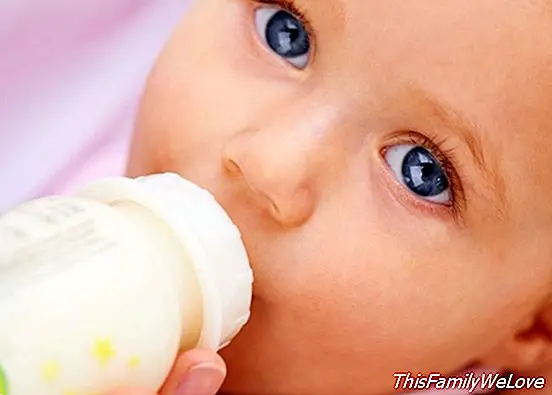Bottle caries

Bottle caries It is a very aggressive caries that affects the milk teeth of the baby by prolonged contact with the sugars in the milk of the bottle or by placing sugary substances in the pacifier. Early diagnosis of bottle caries is difficult and when the lesions are diagnosed in milk teeth or first teeth of the baby are often widespread. It is one of the most aggressive caries known.
What is bottle caries?
The baby bottle cavities They are cavities that affect the milk teeth, especially to smooth surfaces of the upper teeth that progress very quickly. The term is very representative because they are usually detected in children who have prolonged bottle-feeding or prolonged breastfeeding and who, therefore, have introduced solid foods late. It is also associated with the use of a pacifier dipped in sugary liquids.
Making an early diagnosis of bottle caries is difficult because children normally at this age (2-4 years) do not go to the dentist and the initial lesions (whitish) are not alarming. When the parents go to the dentist, the lesions are usually very advanced (light yellow).
The teeth that are most frequently affected by bottle caries are the upper incisors and the first upper and lower temporal molars, since they are the first to erupt. The lower incisors, in general, are not affected since they are protected by the lower lip and tongue.
The cause of the appearance of caries from the bottle
The most important factor in the appearance of baby bottle cavities it is feeding with milk in a bottle for a long time. This resource is sometimes used by parents to calm children with trouble sleeping or just to keep from crying. There is controversy over whether formula milk or breast milk is more cariogenic.
But not only milk produces bottle cavities, in general, all fluids containing sucrose such as vitamin syrups and sugary fruit juices can cause this type of tooth decay. Parents frequently give children fruit juices marketed because they believe they contain large amounts of vitamin C without being aware of its high sugar content.
Not only the bottle, but also the pacifier impregnated with sweetened substances such as honey, jam or condensed milk is associated with the appearance of tooth decay from the bottle. The injuries produced by the pacifier, in general, are less aggressive than those of a bottle.
Factors that include in the appearance of bottle caries
- Frequency and duration of the habit.
- Quantity and quality of the child's saliva.
- Orofacial muscle activity.
- Pattern of eruption of deciduous teeth.
- Structural alterations of the hard tissues of the tooth.
- Buccal breathing.
- Lack of fluoride.
As for the bottle, the habit can be nocturnal or diurnal, which will determine different patterns of tooth involvement:
- When the habit is nocturnal, The most frequent is the child who falls asleep with the bottle in his mouth. The child falls asleep and the milk or sugary liquid accumulates around the teeth, this, together with the decrease of saliva during sleep, favors the appearance of aggressive caries in the upper incisors.
- When the habit is diurnal, "children who carry the bottle on their backs all day", the upper incisors are affected less and lingual caries of the mandibular molars appear.
Sara Hawkins Solís. Lda. Dentistry UCM. Master in Orthodontics UCM. Prof. Collaborator Master of Orthodontics UCM
Blog Mommy pediatrician and more




